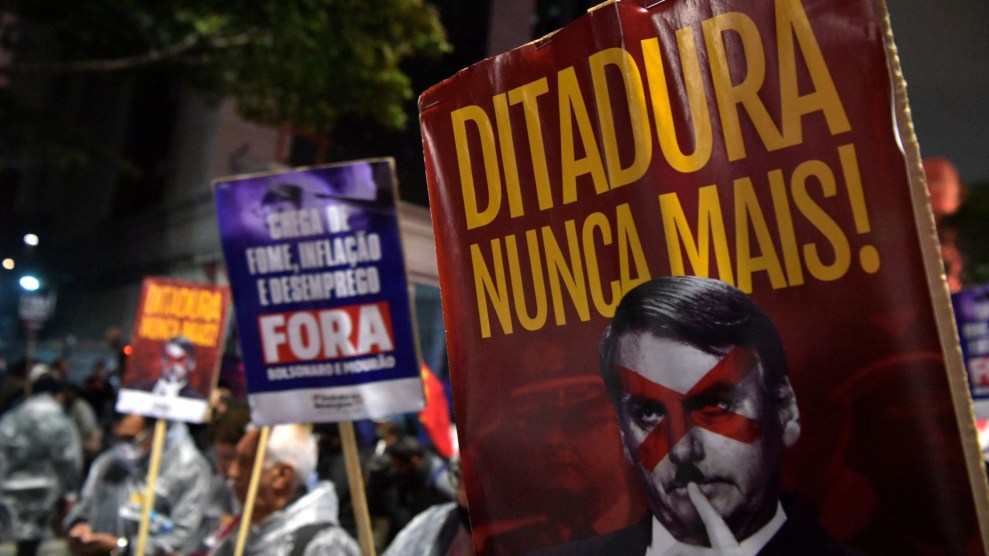
Javier MileiGDA/AP
After finishing first in Argentina’s primary elections on Sunday, Javier Milei is the leading candidate to become the next president of the South American country. A former pugilistic television talking head, the libertarian economist has been dubbed “a new Trump.”
But that’s not quite right.
Yes, Milei, who has served in Congress since 2021, represents the type of outsider politician we’ve seen all around the world. He channels a broad distrust of government and mainstream institutions into populist anti-politics. But in a 2017 profile, Milei gave himself nicknames more indicative of his beliefs: Adam Smith’s heir; the Mozart of Economics; the Keynesian Wrecker. What makes Milei different from his (not particularly) ideological ilk—notably former presidents Donald Trump and Jair Bolsonaro, both of whom he admires—is that Milei is a true believer in libertarian economics.
Milei wants to abolish the Argentine central bank and dollarize the economy. He wants to end public education and replace it with a voucher system. He wants to privatize healthcare and legalize the free trade of human organs. Milei has said that he will eliminate the health, education, and environment ministries and replace them with a one-stop shop “Ministry of Human Capital.” He downplays climate change and wants to make it easier for Argentines to own handguns. As he said during the campaign, his plan is to “change the logic of social policy, where we go from giving people fish to teaching them how to fish.”
These ideas are deeply held. Milei named his Mastiff dogs (which I should include are clones of his first dog Conan, named after the Barbarian) after conservative economists: Milton Friedman, Murray Rothbard, and Robert Lucas Jr. On Sunday, he dedicated his victory to the canines.
In Argentina’s PASO primary system, all voters are required to cast a ballot in the primary election of one of the political parties or alliances, and the candidates who win their primary advance to the general election on October 22. If the winner of the general election fails to cross the 45 percent threshold, the top two finishers advance to a runoff in November. Milei’s party, Liberty Advances (LLA), finished with 30 percent of the vote. In second, with 28 percent was the center-right party Together for Change, whose candidate is the tough-on-crime ex-security minister Patricia Bullrich. In third place at 27 percent was the center-left ruling party Unity for the Homeland, whose ticket is led by Sergio Massa, current President Alberto Fernández’s economic minister.
Milei’s political rise has been fueled by a rejection of the political establishment, especially the “Kirchnerism” of the political power couple Néstor Kirchner and Cristina Fernández de Kirchner, who served as presidents of Argentina from 2003 to 2015. (Fernández de Kirchner is the current vice president.) “This election will not only put an end to Kirchnerism, but also to the parasitic, larcenous, useless caste that is sinking the country,” Milei said in a victory speech.
On Sunday night, Milei described himself as a new force in the history of Argentine politics. “We are the true opposition,” he declared. “We are the only ones who want real change. Because remember: a different Argentina is impossible with the same old ones, who have failed.” Except that Milei represents a very old strain of Argentine politics that his core followers—many under the age of 30—might be too young to remember.
A guy obsessed with Milton Friedman is familiar to anyone who has read about the history of the Cold War in Latin America. In 1976 Argentine President Isabel Perón was ousted in a military coup as part of the United States-backed transnational terror network called Operation Condor. Perón had taken over for her husband Juan, who died in 1974 after reclaiming the presidency the year before. (Juan Perón was ousted in a separate coup in 1955 after nine years as president.) The new government sought to eliminate the labor-friendly “Peronism” by banning trade unions and launching a “dirty war” that would hunt down, torture, and murder between 10,000 and 30,000 suspected leftists and political dissidents over the next seven years. Milei’s running mate Victoria Villarruel has spoken openly about her admiration for these days.
The military junta appointed Adolfo Diz, a former student of Friedman at the University of Chicago, to head up the country’s central bank. The top economic job went to José Alfredo Martínez de Hoz, a son of an elite Argentine family. As Naomi Klein writes in The Shock Doctrine, Argentina’s “Chicago Boys” and Martinez de Hoz transformed the Argentine economy for the interests of the wealthy: freezing wages, lifting price controls, selling off state-owned companies, and opening up the country to foreign investment.
In a realization of the ideas his hero Murray Rothbard encouraged in a paper called “Right-Wing Populism,” Milei combines this older economic logic with a modern culture-war social conservatism. He wants to launch a referendum to make abortion illegal after it was legalized in 2020; he says that sex and gender education is a cultural Marxist plot to destroy the family. “I will not be apologizing for having a penis,” Milei lamented during the campaign. “I don’t have to feel ashamed of being a man, white, blond with light blue eyes.” (He is not blonde.)
Because of his idiosyncratic far-right politics and success as a television news analyst, The American Conservative compared Milei’s rise to if Tucker Carlson ran for president of the United States. Except Milei is so much weirder (high bar!). He has an unkempt mop of hair and mutton chops. He often wears leather jackets. A former member of a Rolling Stones cover band, Milei claims to have seen Mick Jagger’s outfit 14 times in concert. He also collects Elvis records. Milei says he is a tantric sex coach and has bragged about his bedroom prowess. Still, he is bachelor and has said that his sister will fill the role of First Lady. According to El Loco, a new biography by Argentine journalist Juan Luis González, Milei claims to have seen the resurrection of Christ three times.
This eccentricity plays well online. Milei has 1.2 million followers on TikTok, more than all of his opponents combined. His account is managed by Iñaki Gutiérrez and Eugenia Rolón, a couple who describe themselves as “anti-communist” and “anti-feminist” in their Twitter bios and look like children. (Think: What if the Gravel teens were far right?).
It is Argentina’s youth who are driving Milei’s campaign. Mila Zurbriggen, former leader of the youth wing of Milei’s party, described his youth appeal to Open Society: “My generation’s outrage is very deep. It has a profound disgust for politicians. I think Javier [Milei] has been able to channel this rejection very well.”
The libertarians from Milei’s specific ideological niche of the Austrian School of Economics (who often call themselves “Anarcho-Capitalists”), are practically frothing at the mouth that Argentina’s next president might be a “Rothbardian.” But those details may be out of mind for young Argentine voters, who instead are looking to Milei as a protest vote.
Polling, always to be taken with a grain of salt, has shown that most Argentines don’t agree with his proposals. Voters are less interested in Milei’s ideas than what he represents in politics pollster Juan Germano told Perfil: He has been “a great vehicle for channeling anger.” In a country where inflation is above 100 percent and 40 percent live in poverty, it’s not hard to see why people are angry and resonating with Milei’s slogan, which translates to, “Long live freedom, damn it!”
The success of someone like Milei should prompt soul-searching for the country’s progressives. For a model, they might want to look across the border at Brazil. Luiz Inácio Lula Da Silva, who defeated Bolsonaro in 2023 to reclaim the presidency, said this in diagnosing the rise of the global far-right and the challenge for those who wish to defeat them: “When you create hatred within a society; when you create anti-political sentiment; when you take away any kind of hope in people or in existing institutions: Then, well, anything goes.” He then paraphrased the Mozambican writer Mia Couto, “In times of terror, we choose monsters to protect us.”








